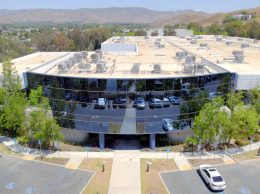Ventura County lags in charitable giving compared to neighboring counties
IN THIS ARTICLE
- Latest news Topic
- Marissa Nall Author
By Marissa Nall Friday, October 2nd, 2015
Ventura County ranks far below neighboring counties and the state in per capita nonprofit revenue, according to a 2015 state of the region report by the Ventura County Civic Alliance.
In 2014, Ventura County nonprofits raised $2,153 per capita compared to $5,356 in Los Angeles County, $5,366 in the state and $6,074 in Santa Barbara County.
Ventura County’s lag in charitable donations was pondered by a panel on philanthropic organizations as California Lutheran University kicked off its annual Corporate Leaders Breakfast Series at the Ronald Reagan Presidential Library on Sept. 25.
It is difficult to pinpoint a “perfect storm” of factors that contribute to the lag, said Dena Jensen, vice president of the Ventura County Community Foundation, who moderated the event.
She said the lag could be related to the high cost of living and newer nonprofits that are still working to create a donor base.
“We know that it’s not because people are not philanthropic or generous here,” Jensen said. “I would wholeheartedly dispute that it’s because we’re not a charitable people.”
Denis Wilson, president of DWP Information Architects, pointed to a higher unemployment rate in the region than statewide.
“We are lagging in employment levels and that may be the driving factor,” he said. “Everybody is contributing if they can afford to and we’re a point behind the California average. With this kind of industry that we have, we shouldn’t be.”
Presentations were given by each panel member, which included Eduardo Cetlin, president of the Amgen Foundation; Vanessa Bechtel, president and CEO of the Ventura County Community Foundation; and Steve Hilton, president, chairman and CEO of the Conrad N. Hilton Foundation.
Other topics touched on were homelessness and global giving.
“Usually when you talk about philanthropic endeavors, the pitch is morally it’s your duty,” said Herbert Gooch, professor of political science at Cal Lutheran. “It’s not just a question of how you bring people in and how you make your arguments. The emphasis has to be on intelligent giving. What strikes me is the need for more professionalization.”
All three panelists talked about strategic giving to address sustainability and have the maximum impact. They also weighed the pros and cons of partnering with other organizations to pool resources.
Educational institutions were the starting point for Bechtel, who said data and networking are important factors in collaboration.
“For me, it’s really starting with the data, starting with the education, starting with the research and then leveraging that into a more comprehensive plan that engages all the relevant players in a focused effort,” Bechtel said.
Partnering with Cal Lutheran and other area schools also helps bring in a younger demographic who are changing the landscape of philanthropy, said Jensen.
“I think the next generation is on everyone’s mind, not just as donors but as volunteers, as a pipeline of executive leadership,” she said. “Younger people want a more activist relationship with charity. They want to give of their money but they also want to give of their time and talent and if we’re not adaptive to those expectations then we’re going to miss the boat.”
After the presentations, the 300 guests were invited to ask questions. A common thread was philanthropy’s role in social change.
“Individually, organizations cannot crack broad social issues,” Jensen said. “That’s actually going to take a collective concerted effort across sectors. It’s not just philanthropy’s role to solve society’s problems but it’s maybe philanthropy as a catalyst bringing the public sector and individuals and the corporate community to really focus around issues that are going to take all of us to solve.”
More individuals and companies should get involved in philanthropy, panelists said.
“Philanthropy is one of the most personal things you can be engaged in,” Bechtel said. “Besides our faith and our family, I don’t know anything that is more personal and gives people the opportunity to realize that inner child within them that says ‘Yes, I can change the world.’”
• Contact Marissa Nall at [email protected].












